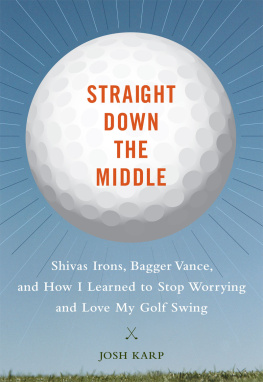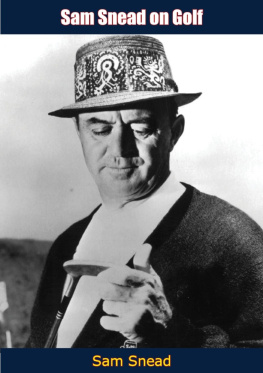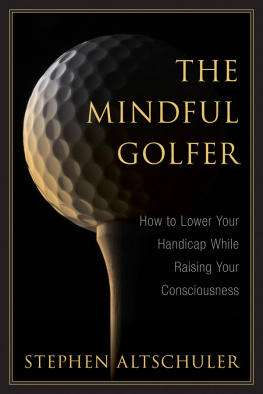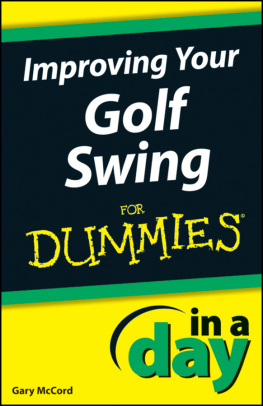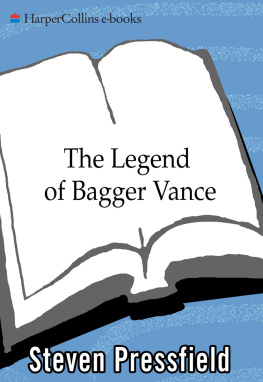
For Susan
Why is it that thousands of people are now having these mini-satori experiences playing golf? Thats fascinating in its own right. People whove never heard of satori, whove never even heard of Zen, who have no spiritual aspiration whatsoeverall these guys out there having spiritual experiences. I think that golf is a mystery school for Republicans.
GOLF IN THE KINGDOM author Michael Murphy
That was a great game of golf, fellas.
Bing Crosbys last words
Introduction:
The Worst Club in My Bag Is My Brain
They say golf is like life, but dont believe them.
Golf is more complicated than that.
Gardner Dickinson
WINTER 2007. EVANSTON, ILLINOIS
They say that every journey begins with the first step. This was mine.
A friend of my wifes once commented that I appeared to be a new soul. This, I was smart enough to realize, was to be contrasted with an old soul, which ostensibly is someone who has been here before and learned the lessons of the world and of life. An old soul has accrued wisdom.
New souls? Well, were another matter completely. Couched in a term that makes us sound open and innocent, the truly enlightened understand this comment to refer to someone whose brain is filled with inconsequential batting averages and memories of long-forgotten episodes of The White Shadow. New souls lack depth. We are free of existential ennui. The comment, though made in good cheer, was a way of saying that I was a banal, happy-go-lucky suburban doofus who loves golf, steak, and Patrick Swayze movies.
Well, I dont much like Patrick Swayze movies. I mean Roadhouse aside. And Point Break. But I get where she was coming from. I am not someone who seems to be pondering the imponderable, and above all else I most likely appear to be a relentless seeker of comfort, the creation of which has been my primary purpose for as long as I can remember. In the world of old souls, I suppose I seem unconcerned with anything that is happening beyond the sports section of my newspaper.
Never was my new soul more staggeringly apparent than during a meditation seminar at Chicagos Shambhala Center where, in a room filled with enlightened beings, I was clearly the only one whod hugged a complete stranger in the mens room moments after the White Sox beat Houston in Game Two of the 2005 World Series.
That evening we sat in a circle for several hours, quietly observing our breath and trying to effortlessly observe our thoughts, while letting them drift away like clouds against a clear blue sky. I found the exercise damn near impossible.
Now, I wasnt new to meditation. Instead, after having been introduced to the practice by a somewhat New Agey friend the year before, Id been trying to meditate for at least ten minutes most days, hoping to clear the anxious cobwebs from my addled brain. Because underneath my seemingly mellow exterior are gut-churning angst and fears that range from disease to a cataclysmic plane crash to financial ruin.
Sitting there, I would breathe inand think about the crap I needed to do around the houseand then out. I would breathe inconsider some new and undetected cancerand breathe out. If there were any clouds blowing across my sky, they looked like black tornadoes.
During a silent break, with my back aching and my mind filled with murderous thoughts toward my fellow aspiring Buddhists (I tried unsuccessfully to let them pass like clouds), I turned away from the herbal tea and vegan baked goods that had been laid out before us and began to wonder how I might lure my wife off to dinner and a movie.
But I was too late. We were called back to the meditation room where our leader, a small, serene software executive named Bob, said we would go around the circle discussing what we had observed or learned from our practice.
As we began, everyone was very clear that we were not to mention goals or ambitions. That kind of practical, purpose-driven stuff is not the point of Zen Buddhism. Instead, even I knew that you meditated because it was what you dida part of your life. It was practicethe practice of returning to your breath, the practice of letting go of your attachment to your thoughts. You meditated to gain greater intimacy with yourself and to be in the present moment, like Thoreau sitting in his doorway at Walden watching the sunlight play on the floor from dawn until night fell.
When others spoke, it seemed that they were getting closer to their true selves. Some had accessed anger they didnt know existed (never a problem for me). Others had become imperceptibly, but definitely, more present.
Then it was my turn: I discussed how meditation had improved my golf game. I mentioned how I got over bad shots more quickly. I said that Id learned to let go of my score a bit and, strangely enough, how doing so had helped me drop a stroke or two.
I glanced around the room only to see my wife shaking her head in resigned recognition, while enlightened smiles turned to sneers of nonjudgmental derision that apparently arise when a new soul gets all purposeful about their meditation.
Bob looked at me warmly. He smiled. And then said, The Sakyong is an avid golfer.
The Sakyong is Sakyong Mipham Rinpoche, the leader of Shambhala and a pretty interesting guy. Author, calligrapher, horseman, poet, and marathon runner, he is something of a Buddhist renaissance man, whose father, Trungpa Rinpoche, is widely credited with bringing Buddhism to the West. A few years older than me, Sakyong Mipham is said to be the reincarnation of Mipham the Great, which I believe is a pretty heavy credential in the world of Zen.
Before that evening I knew quite a bit about the Sakyong, had read part of one of his books, and considered him an all-around fascinating and admirable guy. Now, however, I knew that he was a golfer and was perhaps as close to a Dalai Lama with a gap wedge as I might ever find.
Im not ashamed to admit that my mind wandered in that moment. I began to have visions of myself and the Sakyongflowing robes, the whole bitteeing it up at some mystical golf course where he would help me learn to quiet my mind, achieve inner peace, and lower my handicap in the process. By the time we left the Shambhala Center that evening, I had decided that I was ready to go on a quest.
The quest. My quest, the quest that became this book, was one toward two goalsbetter golf and a better life via the non-traditional Eastern route. I would sample various Eastern approaches to golf and lifemeditation, martial arts, and all other manner of instruction both on the course and offhoping to lower my handicap and find my true, calm, happy self, or vice versa.
I knew that my journey was bound to be filled with false starts, pitfalls, and facing up to the demons that haunt my golf game and my inner life. But I also knew that golf was a legitimate vehicle toward greater self-knowledge. Many have gone before me, and theyve written books about it. Ive read nearly every golf-meets-spirituality novel, how-to, and memoir out there. Ive read Zen Golf, Extraordinary Golf, and Fearless Golf. Ive read Harvey Penicks Little Red Book and Kjell Enhagers Quantum Golf. If somebody with a book deal has learned the meaning of life while playing Pinehurst, chances are the book is sitting on my bookshelf.
But the true heart of this quest lies in two booksThe Legend of Bagger Vance and Golf in the Kingdom. The latter, published in 1972, is what Keith Jackson might call the granddaddy of them all.
For the uninitiated, Golf in the Kingdom is Michael Murphys novel in the guise of a fictionalized memoir of his stopover in Scotland while on his way to an ashram, during which he encounters a shamanic golf pro named Shivas Irons at the mythical Burningbush links. During roughly a twenty-four hour period they play eighteen holes, then undertake a semidrunken all-night exploration of golfs relationship to ancient history, Eastern philosophy, religion, quantum physics, and the meaning of life. The book is a brilliant ramble thatlike most great novels of this naturefails to tie things up neatly, instead leaving the reader with as many questions as it does answers. The story has a beginning, middle, and end but, in essence, is a treatise on the larger meaning of golf. It is fascinating and occasionally incomprehensible. It is also the best-selling golf book of all time.
Next page
